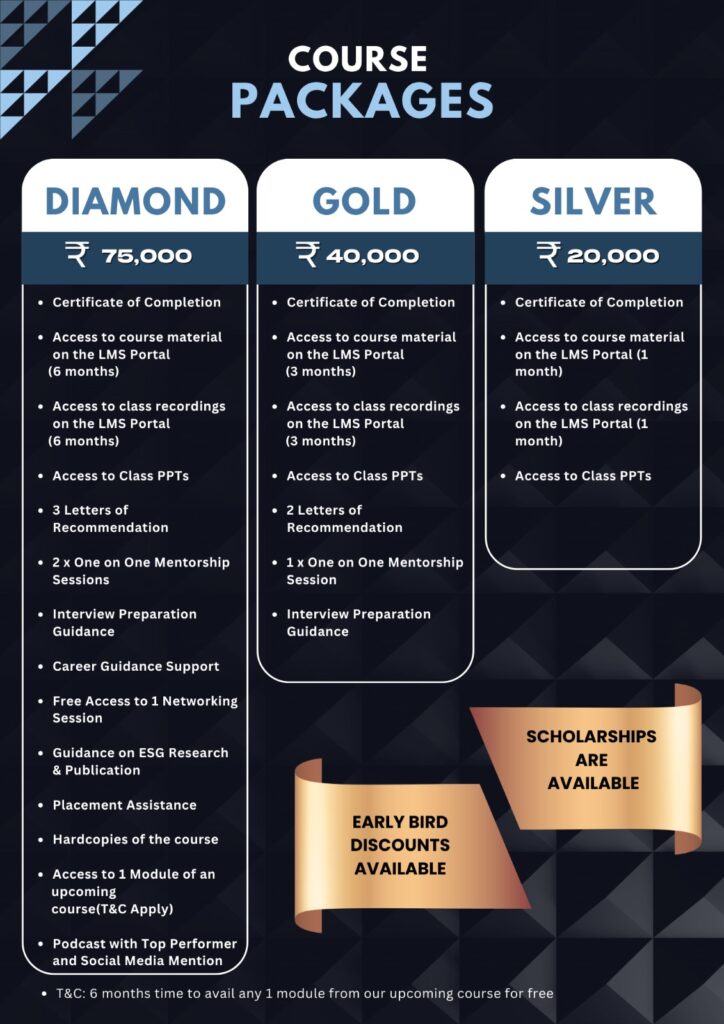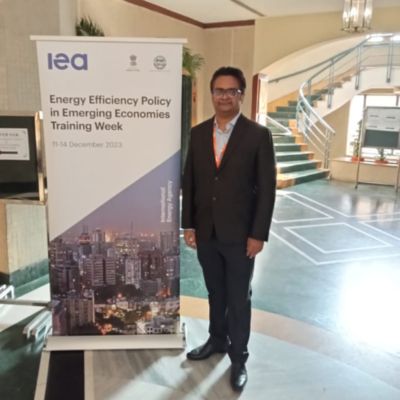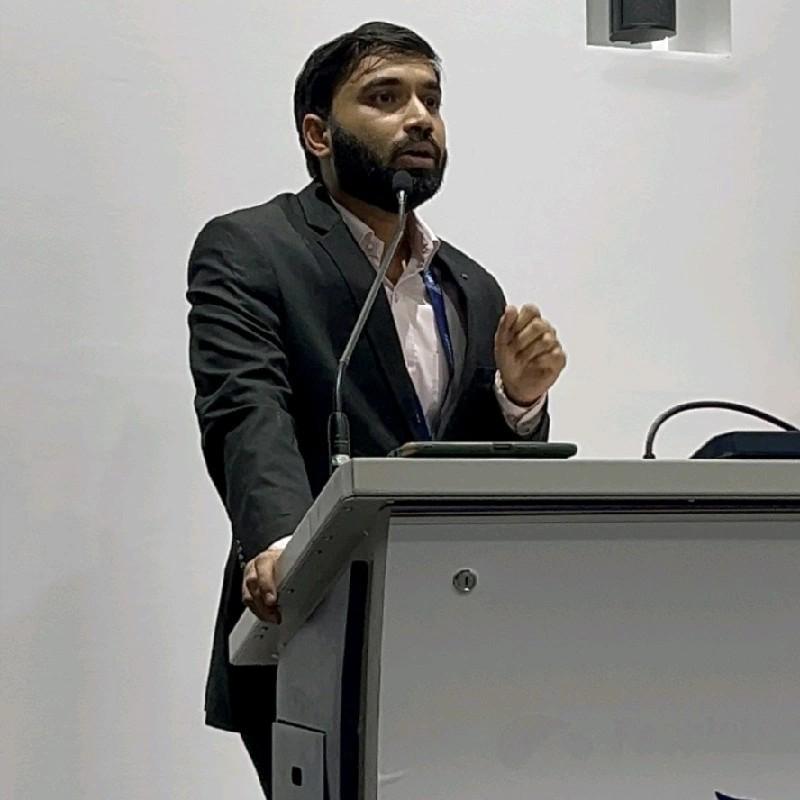Certificate Course on the Fundamentals of ESG Practice
- September 6, 2025 - January 11, 2026
This foundational course on ESG offers a comprehensive introduction to ESG concepts, standards, and practical tools that organizations, investors, and professionals need in order to respond to regulatory and stakeholder expectations.
Through carefully designed course modules, course participants gain a solid understanding of the key principles, frameworks, standards, and skills needed to integrate ESG into business practice and investment decisions, including understanding how ESG contributes to long-term value creation, stakeholder trust, and sustainable development.
About the Course
The course focuses on the practical application of ESG concepts and provides training in the leading global and national disclosure requirements and expectations that are shaping sustainability and corporate governance today, including:
- The Foundations of Sustainability – Tracing the evolution of sustainability, from environmental stewardship to modern ESG frameworks.
- GRI standards – A set of globally recognized sustainability reporting standards developed by the Global Reporting Initiative.
- TCFD (Task Force on Climate-related Financial Disclosures) – A framework to help companies and organizations effectively disclose climate-related risks and opportunities.
- ISSB (International Sustainability Standards Board) – Standards that aim to provide a global baseline for sustainability reporting.
- EU CSRD (European Union Corporate Sustainability Reporting Directive) and ESRS (European Sustainability Reporting Standards) – Europe’s corporate sustainability reporting standards requiring double materiality assessment.
- India’s BRSR (Business Responsibility and Sustainability Report) and BRSR Core – SEBI’s sustainability disclosure requirements for listed companies.
- Materiality Assessment – Understanding the concept of single and double materiality and how materiality assessments are conducted.
- Transparency, Communication and Assurance – Identifying and mitigating risks of greenwashing through effective, transparent communication. Understanding the importance of third-party assurance.
- ESG and Value Creation – Integrating ESG with business strategy, risk management, KPIs, and SDGs.
Who is it for?
This course is designed for a broad range of professionals, including:
- ESG, sustainability, finance, legal, and compliance teams
- Board members and senior leaders seeking an understanding of ESG expectations and requirements
- ESG analysts, auditors, and consultants
- Investors, fund managers, and capital market professionals
- Students and early-career professionals preparing for ESG-aligned roles
- Policy professionals, regulators, and academics seeking a deeper understanding of ESG policy and practice
Whether you are helping your organization prepare an ESG report, develop a climate strategy, attract sustainable finance, or simply make sense of regulatory requirements, this course will provide the foundation and tools that you will need.
Highlights of the Program
- Instructor-led online classes, along with a cohort based model and an additional hybrid option.
- Hybrid participants will have the opportunity to attend two days of seminars, networking sessions, and a roundtable in New Delhi, led by sector and industry experts.
- Comprehensive curriculum
- Real world case studies
- Practical tools and templates
- Access to exclusive resources
- Opportunity for networking with industry and sector leaders
- Guidance on career pathways
Learning Outcomes
By the end of this course, you will:
- Gain an understanding of the core ESG concepts and terminology used across industries and geographies.
- Be able to differentiate between major frameworks and know when and how to apply each.
- Build and interpret a materiality matrix for ESG decision-making.
- Understand how to conduct a GHG inventory and interpret climate-related risks.
- Learn how to engage stakeholders, align internal data, and prepare ESG disclosures.
- Be positioned to support ESG integration into business strategy, reporting, and risk management and take the next steps in your career.
Career Advancement
With increased global and domestic expectations for transparency, accountability and ethical business standards, ESG expertise is not optional anymore, it is necessary. This course prepares learners to meet that need, drive change, and make important contributions to a sustainable future.
Upon completion, the career pathways that this course opens up and supports are:
- ESG Analyst / Specialist
- Sustainability Consultant
- Corporate Governance Advisor
- CSR and Impact Assessment Professional
- Risk and Compliance Officer
- Investor Relations / Reporting Lead
- Environmental Manager / Legal Advisor on ESG
Course Content
- Understanding the history and evolution of sustainability
- Exploring climate change, biodiversity loss, and social challenges with respect to sustainability
- Analysing the environmental, social and economic dimensions of sustainable development
- Examining how individual and corporate actions drive sustainable futures
- Mapping ESG risks, opportunities, and stakeholder expectations
- Integrating ESG into daily functions such as finance, HR, supply chain, and governance
- Positioning ESG as a driver of innovation and competitiveness
- Applying ESG across your business value chain
- Identifying credible internal and external ESG data sources
- Evaluating ESG data quality, materiality, and relevance
- Aligning ESG data with frameworks like GRI, TCFD, ISSB, and BRSR
- Using ESG data for reporting and investment decisions
- The scope and structure of GRI, ISSB, SASB, and TCFD
- Navigating IFRS S1, S2 and the SASB Standards
- Aligning multiple ESG standards for consistency and assurance
- Examining framework-aligned disclosures and reports
- Understanding SEBI’s ESG mandates and the NGRBC principles
- Structuring BRSR disclosures across section-wise data collection guide
- Aligning Indian disclosures with global frameworks like ISSB and GRI
- Preparing audit-ready ESG reports on the basis of industry focused best practices
- Identifying ESG-related legal duties and sector-specific regulations
- Understanding environmental, climate, labour, and human rights laws and their intersections
- Evaluating governance obligations and the duties of boards and directors
- Understanding the development of climate litigation in India
- Understanding what materiality means in ESG reporting
- Distinguishing between single and double materiality
- Comparing materiality across major standards (ISSB, GRI, CSRD, SASB, TCFD)
- Aligning stakeholder engagement and materiality assessments
- Ensuring credibility through transparent and accurate reporting and communication
- Analysing greenwashing and disclosure misalignment
- Understanding the importance and scope of third-party assurance in ESG reporting
- Understanding third-party assurance frameworks (ISAE, AA1000)
- Understanding how ESG rating and scoring systems work
- Understanding the future of carbon markets
- Exploring the role of ESG in sustainable finance and investing
- Learning about EcoVadis certification and scoring criteria.
- Embedding ESG into business strategy, operations, risk assessments and management
- Aligning ESG KPIs with SDGs and corporate goals
- Mapping ESG impact across the value chain and product design
- Learning from case studies and India's ESG leadership trends
Admissions are currently open!
Fees

The M.C. Mehta Centre for Education and Research will grant an extra 10% fee concession on this special offer to reserved category candidates – Scheduled Caste (SC), Scheduled Tribe (ST), OBC (Non-Creamy), Economically Weaker Session (EWS), ajnd Persons with Disabilities (PwD).
*Terms & Conditions Apply
*GST applicable as per government regulations
SCHOLARSHIPS ARE AVAILABLE
EARLY BIRD DISCOUNT AVAILABLE
For more information on our packages, discounts and scholarships ask our academic advisor at +91-92119 81186
Fees
Diamond
- Certificate of Completion
- Access to course material on the LMS Portal (6 months)
- Access to class recordings on the LMS Portal (6 months)
- Access to Class PPTs
- 3 Letters of Recommendation
- 2 x One on One Mentorship Sessions
- Interview Preparation Guidance
- Career Guidance Support
- Free Access to 1 Networking Session
- Guidance on ESG Research & Publication
- Placement Assistance
- Hardcopies of the course
- Access to 1 Module of an upcoming course(T&C Apply)
- Podcast with Top Performer and Social Media Mention
Gold
- Certificate of Completion
- Access to course material on the LMS Portal (3 months)
- Access to class recordings on the LMS Portal (3 months)
- Access to Class PPTs
- 2 Letters of Recommendation
- 1 x One on One Mentorship Session
- Interview Preparation Guidance
Silver
- Certificate of Completion
- Access to course material on the LMS Portal (1 months)
- Access to class recordings on the LMS Portal (1 months)
- Access to Class PPTs
The M.C. Mehta Centre for Education and Research will grant an extra 10% fee concession on this special offer to reserved category candidates – Scheduled Caste (SC), Scheduled Tribe (ST), OBC (Non-Creamy), Economically Weaker Session (EWS), ajnd Persons with Disabilities (PwD).
*Terms & Conditions Apply
*GST applicable as per government regulations
SCHOLARSHIPS ARE AVAILABLE
EARLY BIRD DISCOUNT AVAILABLE
For more information on our packages, discounts and scholarships ask our academic advisor at +91-92119 81186
Faculty

Advocate M.C. Mehta
Advocate Mahesh Chander Mehta is a distinguished advocate who has dedicated his career to public interest litigation. His advocacy for environmental justice, especially in high-profile cases concerning pollution and industrial regulation, has earned him international recognition. His leadership and expertise continue to drive significant changes in environmental policy and legal compliance worldwide. For his immense contribution to environmental law he has received a number of awards and accolades, such as the Padma Shri, Magsaysay Award and the UNEP Global 500 Award, to name a few.

Tu Rinsche
Ms. Tu Rinsche is a global leader with over two decades of experience in advancing social impact, human rights, and corporate responsibility across public, private, and nonprofit sectors. She brings deep expertise in global public policy, stakeholder engagement, corporate risk, supply chain compliance, and programme development. She has held leadership positions at global companies, such as Starbucks, HP, Walt Disney, Marriott, and The Ritz-Carlton, where she led high-impact human rights and social sustainability initiatives. She also previously worked at the U.S. Department of State, where she contributed to advancing democracy and human rights policy and programming. She has also served on the boards of Verité and Summer Search. As an independent advisor, she works with organisations to develop global impact strategies. Her insights have been featured in global media including The New York Times, Fast Company, Forbes, Teen Vogue, and Refinery29. Among her many prestigious awards, she has received the 2019 Corporate Social Responsibility Award from the Nomi Network in recognition of her dedication to human rights.

Labanya Prakash Jena
Mr. Jena has over 20 years in financial services, green finance, and international development. He is working as a a climate finance expert at the Asian Development Bank, a Sustainable Finance Consultant at the Institute for Energy Economics and Financial Analysis (IEEFA), and a Visiting Senior Fellow at the London School of Economics and Political Science (LSE). Prior to this he has worked with the Council on Energy, Environment and Water (CEEW), Climate Policy Initiative, Commonwealth Secretariat, UNDP, and World Resources Institute. He co-authored a book, “Net-Zero Trio: Synchronizing Technology, Business, and Policy for Green Transition,” which has been published by Bloomsbury.

Dr. Tarini Mehta
Dr. Tarini Mehta is a Professor, Advocate and GARP SCR-certified Strategic Environmental and Climate Law and Policy Specialist, with over 12 years of global expertise in ESG, environmental and international law. She has held senior roles at O.P. Jindal Global University, as well as advised and worked with the UK Focal Point for the EU Fundamental Rights Agency, Normandy Chair for Peace, the Global Centre for Environmental Legal Studies, Indian Council for Enviro-Legal Action, and the International Bar Association, among others.

Rajib Bhattacharjee
Rajib Bhattacharjee is an ESG and sustainability leader with more than 15 years of expertise, currently serving as AGM & Head of Project Development at Staten Solar, based in Bengaluru. He completed his education from IIM Indore, one of India’s leading business schools. He holds the prestigious CFA designation in ESG Investing and is certified by GARP as a Sustainability and Climate Risk (SCR) professional, specializing in renewable energy and climate change solutions. His extensive experience at Staten Solar in leading project development across renewable energy sectors positions him as an expert speaker, who is able to translate complex sustainability challenges into investment-aligned strategies for businesses.

Aayush Anand
Aayush Anand is a sustainability and climate risk expert with over 15 years of experience in the energy and infrastructure sector. He has led key projects with multilateral and public sector organisations with a strong focus on green buildings, renewable energy integration and decarbonization policy development. He holds an Engineering Degree from MIT Manipal and an MBA from IIM Ranchi, complemented by the prestigious GARP Sustainability and Climate Risk (SCR) certification. Among his published reads, he authored an article in The Hindu titled “The Union Budget as a Turning Point for Climate Action”, where he emphasized the urgency of aligning fiscal policy with India’s Net-Zero ambitions. His experience in ESG and Sustainability is further strengthened by his work with the Ministry of New and Renewable Energy and his OPFA Fellowship, where he has contributed to national-level clean energy strategies.

Dr. Seema Nihalani
Dr. Seema Nihalani is an experienced environmental engineering academic and practitioner, working as an Assistant Professor at Parul University for the past 10 years. She previously worked as a Technical Manager at Geo Designs & Research Pvt Ltd. With a strong research background in water quality, wastewater treatment, and pollution management, she provides a unique combination of technical depth and real-world applicability to the ESG discussion. Her considerable expertise doing Environmental Impact Assessments and regulatory compliance projects makes her an expert at converting sustainability goals into effective frameworks for businesses. As a speaker, she provides unique insight into our ESG course, drawing on both academic research and practical experience.

Raghuvir Raghav Das
Raghuvir Raghav Das, an International Climate Protection Fellow with the Humboldt Stiftung, is a sustainability strategist with over a decade of experience in environmental finance, policy design, and clean technology. His pioneering research on incorporating plastic credits into global climate frameworks such as the Global Plastics Treaty and Article 6 of the Paris Agreement reflects his contribution to evolving ESG mechanisms. With dual Master’s degrees in Public Policy and Environment & Development, he has consulted on carbon markets, energy-efficient industrial policy, particularly for Tamil Nadu’s key sector and sustainable waste management. His award-winning policy work, recognized in the NASPAA Batten Policy Simulation Competition, demonstrates his ability to drive meaningful solutions for sustainable cities.

Mahak Agrawal
Mahak Agrawal is an urban planner, climate scientist, public policy and sustainability expert, with deep experience advancing sustainability, equity, and climate resilience across sectors and continents. She is the initiator of All Bits Count (ABC)—a creative climate action project launched at the UN Summit of the Future and UN Climate Change Conference COP29—and serves on the Steering Board of the ITA-AITES Committee on Underground Space (ITACUS) and the Board of the International Society of City and Regional Planners (ISOCARP). She is also a LinkedIn Top Green Voice, TEDx Fellow, and former United Nations fellow.

Dr. Anandajit Goswami
Dr. Anandajit Goswami is an acclaimed energy economist and sustainability scientist with over 22 years of experience in climate-resilient green growth, sustainable development, and energy policy. He is a Research Fellow at the Ashoka Centre for A People-Centric Energy Transition, and Honorary Visiting Professor at the IMPRI Impact and Policy Research Institute, as well as Director of the Manav Rachna International Institute of Research & Studies.

Prof. Aditya Baheti
Prof. Aditya Baheti is an Assistant Professor in Corporate Law at the Presidency School of Law. He holds an LL.B. from Campus Law Centre, University of Delhi, and earned his LL.M. from the National Law University, Jodhpur, graduating with a gold medal. He has also qualified as a Company Secretary (ICSI) and secured the UGC NET with JRF. He recently gave his insights in the Corporate Governance & Sustainability Conclave 2025 at IIM Bangalore, engaging in thought-provoking discussions on accountability, innovation, and boardroom practices. He is a published scholar and co-author of the recent book “Re-Imaging Intellectual Property Rights: Interactions of Law, Technology, Economics, and Social Innovations.” This research paper explored how Al, blockchain, and biotech are reshaping IP regimes and the importance of harmonised, multi-disciplinary legal frameworks.
